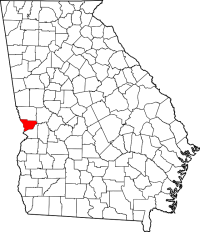The children’s home in Columbus was infested with cockroaches. Trash and cigarette butts littered the floor, which had holes in it as well.
The DFCS staff in Muscogee County immediately recognized that the three young kids were in an unsafe environment.
The children’s grandmother, who lived across the Chattahoochee River in Phenix City, Ala., was willing to take them in. But her home, though nearby, was not in Georgia. And in many parts of the nation, vulnerable children are not relocated across state lines.
Fortunately, thanks to a cross-border child welfare agreement between Georgia and Alabama, the placement was made within hours. The grandmother came and picked up the kids, who ranged in age from 1 to 7. Their mother received help, and within 45 days, the children were able to return home to her in Columbus.
The agreement to place some vulnerable Georgia children in Alabama — and some Alabama children in Georgia — is unprecedented in its scope, officials say.
Niesha Robinson, director of child welfare in Muscogee, in describing the case of the three kids, tells GHN, “If we don’t have an active border agreement, these kids would have gone into foster care.’’
Being placed in foster care “can be extremely traumatic’’ for children, says John James, deputy director of the Family Services Division for the Alabama Department of Human Resources. No other states have a border agreement this broad, James adds.
More than 70 kids in Alabama and Georgia have been able to avoid entering foster care as a result of the agreement.
Originally a pilot project between Georgia’s Muscogee County and Alabama’s Russell County, the agreement recently expanded to all counties along the boundary between the two states. Georgia also has border pacts with Florida, South Carolina and Tennessee.
Alabama is working on creating a similar partnership with Mississippi.
“A state line shouldn’t be a barrier when it comes to finding the safest and most appropriate place for a child to live,” Georgia DFCS Director Bobby Cagle said in a recent statement. “Very often, the children we work with have a relative just one county over who can provide a safe and loving home for them in a time of crisis, eliminating the need for them to come into foster care. If the next county over happens to be in another state, that shouldn’t stand in the way of the child’s best interest.”
When a child in danger has a relative in the bordering state, officials in that state will assess the potential new home. The receiving state also will do a criminal background check on the people in the home.
A placement can be handled in a matter of hours, with the parent voluntarily placing the child with a relative in the bordering state.
The sending state is still responsible for the child, while the receiving state makes regular contact with the children. After 45 days, the child can stay in the receiving home but enters foster care at that point, James says.
James credits a Georgia juvenile judge, Brett Hammond, as an initial champion of these agreements. Hammond’s jurisdiction is in the Augusta area, just across the Savannah River from South Carolina.
The border pacts can be replicated elsewhere, James says. It works well when child welfare staff “buy into it,’’ he says.
Georgia’s border agreements with Florida and South Carolina differ from the Alabama one in that the children are already in foster care, yet have a relative across the border who may serve as an appropriate placement as opposed to remaining in a foster home. Georgia’s Tennessee pact is similar to its Alabama agreement.
“When we seek to protect a child from an abusive situation, we must also seek to protect them from the trauma of having to break ties with their extended families and their communities when they are removed from their homes,” Nancy Buckner, commissioner of the Alabama Department of Human Resources, said in a statement. “The level of cooperation between Georgia and Alabama is unprecedented and allows children the opportunity to be with caregivers who are not only capable of caring for them but who are familiar to them.”
Rachel Davidson, Georgia DFCS Juvenile Court liaison, says, “This agreement has helped strengthen the relationship between the two states.’’


